
Gildas — also known as Gildas the Wise or Gildas Sapiens — was a 6th-century British monk best known for his scathing religious polemic De Excidio et Conquestu Britanniae, which recounts the history of the Britons before and during the coming of the Saxons. He is one of the best-documented figures of the Christian church in the British Isles during the sub-Roman period, and was renowned for his Biblical knowledge and literary style. In his later life, he emigrated to Brittany where he founded a monastery known as St Gildas de Rhuys.

Samson of Dol was a Christian religious figure, who is counted among the seven founder saints of Brittany with Pol Aurelian, Tugdual or Tudwal, Brieuc, Malo, Patern (Paternus) and Corentin. Born in southern Wales, he died in Dol-de-Bretagne, a small town in north Brittany.
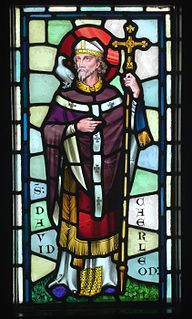
Saint David's Day, or the Feast of Saint David, is the feast day of Saint David, the patron saint of Wales, and falls on 1 March, the date of Saint David's death in 589 AD. The feast has been regularly celebrated since the canonisation of David in the 12th century, by Pope Callixtus II, though it is not a public holiday in the UK.

The national flag of the United Kingdom is the Union Jack, also known as the Union Flag.

Saint Winifred was a Welsh virgin martyr of the 7th century. Her cult was celebrated as early as the 8th century, but became popular in England in the 12th, when her biography (vita) was first written down.
Conan Meriadoc is a legendary Celtic leader credited with founding Brittany. Versions of his story circulated in both Brittany and Great Britain from at least the early 12th century, and supplanted earlier legends of Brittany's foundation. His story is known in two major versions, which appear in the Welsh text known as The Dream of Macsen Wledig, and in Geoffrey of Monmouth's Historia Regum Britanniae. Both texts associate him with Magnus Maximus, a Roman usurper against the Valentinianic dynasty who was widely regarded as having deprived Britain of its defences when he took its legions to claim the imperial throne. Conan's cousin or sister, Saint Elen, is said to have been Macsen Wledic's wife.
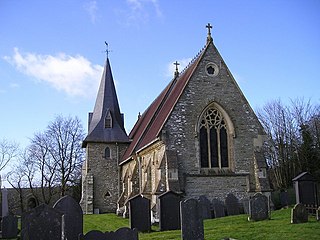
Saint Cynllo is a British saint, who lived in the late 5th and early 6th centuries, generally described as a brother of Saint Teilo. Cynllo was known for "...the sanctity of his life and the austerity of his manners."

Saint Beuno, sometimes anglicized as Bono, was a 7th-century Welsh abbot, confessor, and saint. Baring-Gould gives St Beuno's date of death as 21 April 640, making that date his traditional feastday. In the current Roman Catholic liturgical calendar for Wales, he is commemorated on 20 April, the 21st being designated for Saint Anselm.

Levi Richards was an early leader in the Latter Day Saint movement and a missionary for The Church of Jesus Christ of Latter-day Saints. He was a member of the Council of Fifty and Anointed Quorum and served as a physician for movement founder Joseph Smith and others during the years the Latter Day Saints were established in Nauvoo, Illinois. Richards was an older brother of church apostle Willard Richards.
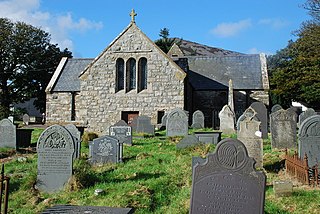
Llanaelhaearn is a village and community on the Llŷn Peninsula in the county of Gwynedd, Wales. The community includes the larger village of Trefor and has a population of 1,067, increasing to 1,117 at the 2011 Census.

Saint Cwyllog was a Christian holy woman who was active in Anglesey, Wales, in the early 6th century. The daughter, sister and niece of saints, she is said to have founded St Cwyllog's Church, Llangwyllog, in the middle of Anglesey, where a church is still dedicated to her.

Edern ap Nudd was a knight of the Round Table in Arthur's court in early Arthurian tradition. As the son of Nudd, he is the brother of Gwyn, Creiddylad, and Owain ap Nudd. In French romances, he is sometimes made the king of a separate realm. As St Edern, he has two churches dedicated to him in Wales.
Caffo was a sixth-century Christian in Anglesey, north Wales, who is venerated as a saint and martyr. The son of a king from northern Britain who took shelter in Anglesey, Caffo was a companion of St Cybi, and is mentioned as carrying a red-hot coal in his clothes to Cybi without his clothes getting burnt. After leaving Cybi, Caffo was killed by shepherds in the south of Anglesey, possibly acting in retaliation for insults Caffo's brother had paid to the local ruler. The area where he died has a village, Llangaffo, named after him, as well as the parish church of St Caffo, Llangaffo.

Saint Teilo, also known by his Cornish name Eliud, was a British Christian monk, bishop, and founder of monasteries and churches. He was from Penalun (Penally) near Tenby in Pembrokeshire, south Wales.
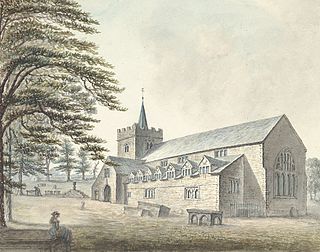
Guilsfield is a village and local government community in Montgomeryshire, Powys, Wales. It lies beside Guilsfield Brook about three miles north of Welshpool. It is located on the B4392 road and a disused branch of the Montgomery Canal starts nearby. The community has an area of 30.01 km2 (11.59 sq mi) and had a population of 1,640 in 2001. rising to 1,727 in 2011. The community includes the villages of Burgedin and Groes-lwyd. The village itself had a population of about 1,220.
Cyllin was a legendary, and possibly historical British king of the 1st century AD, early Christian saint and the last pendragon of Great Britain. His existence is based on very limited evidence. Richard Williams Morgan claimed that a reference to him as a son of Caratacus was found in the family records of Iestyn ab Gwrgant and used this as evidence of early entry of Christianity to Britain;
Cyllin ab Caradog, a wise and just king. In his days many of the Cymry embraced the faith in Christ through the teaching of the saints of Cor-Eurgain, and many godly men from the countries of Greece and Rome were in Cambria. He first of the Cymry gave infants names; for before, names were not given except to adults, and then from something characteristic in their bodies, minds, or manners.

Saint Eigen, Eurgen, Eurgain or Eurgan was the legendary, and possibly historical first female Christian saint among the Britons. Her name has doubtfully been linked to two Welsh churches and is found in manuscripts from the collection of Iolo Morganwg making historical evidence of her existence dubious and limited.

In the United Kingdom, the term listed building refers to a building or other structure officially designated as being of special architectural, historical, or cultural significance; Grade I structures are those considered to be "buildings of exceptional interest". Listing was begun by a provision in the Town and Country Planning Act 1947. Once listed, strict limitations are imposed on the modifications allowed to a building's structure or fittings. In Wales, the authority for listing under the Planning Act 1990 rests with Cadw.

Saint Einion Frenin was a late 5th- and early 6th-century Welsh confessor and saint of the Celtic Church. His feast day was originally given as 9 February, although this had moved to the 10th or 12th by the 16th century and is no longer observed by either the Anglican or Catholic church in Wales.
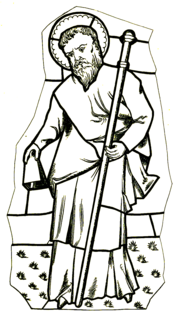
Saint Aelhaiarn or Aelhaearn was a Welsh confessor and saint of the British Church. He was a disciple of Saint Beuno. His feast day was usually observed on 2 November, although it is sometimes recorded as the 1st and is no longer observed by either the Anglican or Catholic church in Wales.

















